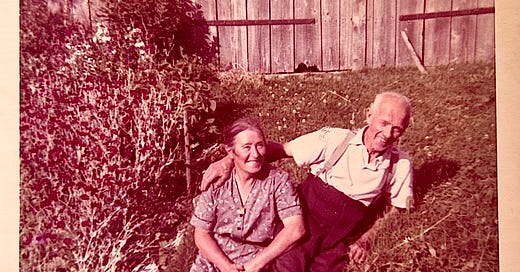As a kid growing up in Switzerland, I always thought my grandmother Rosalie looked like a Native American. Her long, pitch-black hair was tied up in a bun, her nose strong, her weathered skin brown from the fieldwork in the sun. She was a woman of great strength and goodness who overcame many challenges in her modest life. Losing her mother early, Rosalie and her sister Lina had to run the household on the little farm in the green hills. Her stern father, Ruedi, and her brother, Fritz, cared for the livestock. Frieda, another sister, was locked in a childlike state and could only perform simple supervised tasks on the homestead. The laborious work of the household was left to the two young girls.
I was fascinated by my grandmother's dark farm kitchen. Looking up at the high ceiling, I saw a never-ending black hole. Rosalie's farmhouse kitchen was a smokehouse. Back then, farms had no refrigeration, and channeling smoke from her woodburning stove was the only way to preserve fresh meat. After sitting too long in the kitchen, my eyes started to burn from the smoke above me.
Rosalie was a lousy cook but a fantastic storyteller. After a simple meal on our wintery Sunday visits, we would listen and gather in the living room on the tiled, warm sitting oven. They were engaging stories, mostly about her young years working in wealthier homes away from her village. Her memories were peppered with amusing and sad tales, often accompanied by her laughter or tears.
Rosalie loved our weekly visits. My mother always dressed my sister and me in matching pleated skirts and handmade woolen tights. It was fun for us to leave the city and enter the tranquility of the Swiss countryside. Our visit was only complete with a stop at the cowshed. Looking at their five beautiful cows and the handful of calves, Rosalie updated us on her animal's due dates and behaviors. Sometimes, as a cow would poop or urinate, my grandmother quickly stepped in front of my sister and me, spreading her big apron to protect our Sundays best from the smelly splatters.
After saying goodbye, on our way back to the city, my grandmother always stood outside her wooden farmhouse and waved with a big white handkerchief until our car disappeared behind the green hills.
My sister and I suspected that Rosalie, in her youth, was popular with young gentlemen. Proofs were all the stored, neatly written postcards we found in a box on our secret excursion up on the top floor of the farmhouse. Those kitchy black and white cards were often signed with the words "your devoted friend" followed by a man's name. And there were many cards with many different names!
Looking back, despite living an ordinary life, Rosalie was a woman ahead of her time. After marrying my grandfather and giving birth to three sons, my grandmother made most of the decisions on the farm. She was the one who negotiated the price with the cattle dealer when a cow had to be sold. She knew when the wheat was ripe enough to be cut, the potatoes ready to be harvested, and the hay dry enough to be stored in the barn. My grandfather liked it that way and trusted her choices.
It was a long time before women's suffrage finally came to Switzerland. In the early 1960s, a Swiss woman could not get an outside job without consent from her husband, and married women could not open their own bank accounts or make significant family decisions.
A story circulated in the village that Rosalie once spat at the feet of the mayor, whom she disliked. I was amazed at how tough Rosalie bargained with the merchants at the monthly outdoor markets in the nearby town. Before we left for the shopping excursion, my grandmother stood in front of her mirror, clipped a few hairs off her chin, put on a little hat, and off we went.
Once a year, on Mother's Day, my father picked up my grandparents and brought them to our house in the city. During the car ride, Rosalie looked out the window and commented on the forests and fields that flew by: "Look how flat these pastures are; look at those beautiful horses, look at these big farmhouses!" Every year, Rosalie brought us the same delicious buttercream cake from the village bakery packed in a big cardboard box.
In her early seventies, while helping a neighbor farmer with the potato harvest, Rosalie suffered a stroke. It robbed her of her voice and her ability to walk. Communication reached a standstill, a tragic end to her storytelling.
Now, I am telling her story, a little excerpt from my grandmother's life. Her voice has fallen silent, but my memories stay. To this day, when my children or I leave my grandparents' farm, which is still in the family, my mother stands at the same place outside the house, waving a white handkerchief until the car disappears behind the hills.




A sweet ode to Urgrossmutter Rosalie. Thank you for giving us this.
Beautiful, Ricki. ❤️